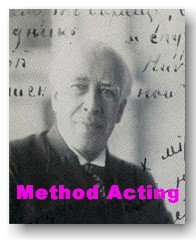[ advertising space ]

"Performance events require a performer, a text, an audience, and a context." (16)
The last is the most interesting. "Context includes the social, political, historical, psychological and aestetic factors that shape the way we understand the text." (17)
Who does provide the frame of references (context)? Should we go back to the public? "... the performer-as-audience" (18). What about "audience-as-performer"? That's where director comes in!
[To illustrate the "mindscape" life of drama, I am using the graphics from the HamletDreams. Dante's organization of the other world is a mental construction, dramatization of the ideas. I plan to bring the structure of the Self (Super-Ego , Ego, It) in the picture. The stage spectacle is projected into this inner creative environment, the place where the real action (emotion-thought) takes place. ]
This is the easy one!
Of course, Spectator directs!
Who else?

Classes: Aesthetics

meyerhold.us

Method for Directors?
stanislavsky.us

ShowCases: 3 Sisters, Mikado, 12th Night, Hamlet, The Importance of Being Earnest, Dangerous Liaisons, Don Juan
prof. Anatoly Antohin Theatre UAF AK 99775 USA (907)474-7751

my eGroups
Read Nietzsche, if you want to understand how to direct our (modern) public!
THEATRE OF ONE
I have to bring the idea of Doubling or Dialectics. Hell and Heaven, Good and Bad, Right and Wrong, Light and Darkness, Silence and Scream -- the opposites is the basis for the conflict and must have the same inner organization. Aristotle established from the start Tragedy and Comedy as two main genres. Also, fear and pity (the emotional structure must be described in details).
Following the directions, Actor inside Spectator performs the drama (the border between theatre and ritual, when spectator becomes a hero. Again, the Identification Principle from the Method Acting).
Summary
What do they do, our directors? What do they direct? Actors? Spectators through actors? But what do they direct in spectators? Scripts? Emotions, thoughts! Everything else is the means, forms, tools to do it -- my dramatic experience is what I need from the show.Questions
What languages do I use to produce this dramatic experience in public? The languages they understnd. Words, movement, light, sounds, body language... many.Notes
I placed pix from Dante's Divine Comedy in order to illustrate the machine of imagination, which already exists in the mind of my audience. All I have to do it PLAY it. Take a note of the vertical structure; at the end (top of bottom) is ONE. This is the paradox: public could become one, but through individual experiences (the chronotope of the show and the laws governing perception in each and all are the same). Inretesting that our percenption is always multileveled -- polyphonic, they say. The orchestra!
I am now going to tell you out of what material an artist of the theatre of the future will create his masterpieces. Out of ACTION, SCENE, and VOICE. Is it not very simple? (Bradby and Williams 1988, 6)
87. Audience doesn't listen... Only after they see...
...









